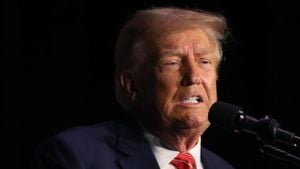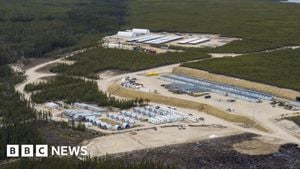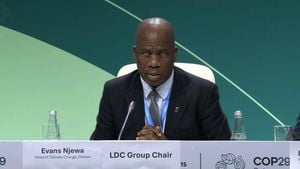Shares of major vaccine manufacturers experienced significant declines on Thursday following the announcement of Robert F. Kennedy Jr. as President-elect Donald Trump's nominee for the position of secretary of the Department of Health and Human Services (HHS). This development raises concerns among investors, particularly considering Kennedy Jr.'s prominent status as one of the leading vaccine skeptics in the U.S.
On the day of the announcement, Moderna saw its stock fall by 5.6%, closing at $39.77—its lowest point of the year. Similarly, Novavax experienced a more dramatic drop of over 7%, closing at $7.22, and BioNTech saw shares slide by 7%, ending at $103.56. Other companies like Pfizer and GSK also reported declines, with Pfizer's shares closing down 2.6% at $26.02.
The turmoil unfolded as news began to circulate just before market close, prompting panic among investors. Analysts believe the impact of Kennedy Jr.'s influence—should he be confirmed—is alarming. His stance against vaccines has been well-documented, and experts fear he may promote anti-vaccine narratives within HHS.
Kennedy Jr. has long advocated for vaccine safety concerns, often citing unsubstantiated claims linking vaccines to various health issues, including autism—a theory debunked by extensive scientific studies. Despite his assertions of supporting vaccinations, Washington insiders view his nomination as potentially damaging to public health efforts. He has stated intentions to initiate investigations on vaccine safety but critics doubt the objectivity of such inquiries.
This announcement is particularly relevant as the United States continues to battle declining vaccination rates against COVID-19. Sales for vaccines have diminished since the peak of the pandemic, during which Pfizer, for example, generated substantial revenue largely thanks to its vaccine Comirnaty and its antiviral pill Paxlovid. After experiencing record-breaking sales of nearly $57 billion from COVID-related products last year, Pfizer has since revised its expectations downward amid slowed demand.
A troubling backdrop for this situation is the CDC's recent report indicating a global surge in measles cases, which rose by 20% to 10.3 million worldwide. While the CDC did not directly attribute the increase to vaccine hesitancy, public health advocates are concerned about how Kennedy Jr.'s potential policies at HHS might erode trust in vaccines, which are known to prevent outbreaks of diseases like measles.
During his announcement, Trump underscored Kennedy Jr.'s mission to combat what he described as misinformation from the pharmaceutical industry, including what he believes contributes to chronic illness rates among Americans. Trump emphasized the need for transparency and adherence to scientific research, framing Kennedy Jr.'s appointed role as pivotal for public health reform.
Despite Trump’s optimistic projections of Kennedy Jr.'s capabilities, many healthcare professionals have voiced alarming concerns. For example, infectious disease physician Apu Akkad remarked, "Kennedy Jr.’s nomination could spell disaster for public health practices. We need someone at HHS who values scientifically backed health recommendations, not skepticism.”
Meanwhile, lawmakers like Democratic Congressman Robert Garcia of California expressed outrage at Kennedy Jr.'s nomination, arguing it could undermine vaccine distribution, which has been integral to combatting public health crises. Garcia stated, “This is insane—his anti-vaccine stance has the potential to set back decades of progress we’ve made.”
On the financial front, investor sentiment has soured due to the compounded issues of reduced demand for vaccines post-pandemic and now the threat of augmented doubt created by Kennedy Jr.'s advocacy against vaccinations. His health-flavored rhetoric also extends to other areas, proposing controversial ideas such as removing fluoride from water sources—even before being confirmed to his role.
With pressure mounting, companies such as Moderna, Pfizer, and Novavax are continuing to contend with the fallout. The losses on Thursday starkly highlight the broader apprehension of investors as uncertainty looms around health policies under Kennedy Jr.'s potential stewardship.
Analysts will be closely monitoring the developments following Kennedy Jr.’s nomination, including any proposed changes to vaccine policies and public health initiatives should he take office. The stakes are undeniably high, not just for the pharmaceutical companies but for the health and safety of the American public.
Although Trump has attempted to calm fears surrounding Kennedy Jr.'s appointment, many remain skeptical of how this could affect public health. Kennedy’s vocal opposition to vaccines could hinder efforts to alleviate vaccine hesitancy and stave off outbreaks of preventable diseases, leaving many unsettled about the future direction of federal health policy.



